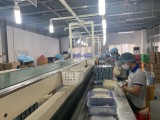New FDI wave set to bring both challenges and opportunities
Along with political determination, there is still plenty of work still left to be done to make Vietnam a truly reliable destination for foreign investors, with an array of opportunities ready to welcome a new wave of foreign direct investment.

This comes after the Politburo for the first time issued a separate resolution on foreign investment attraction, Resolution 50 /NQ-TW dated August 20, 2019, relating to orientations aimed at fine-tuning institutions and policies, whilst improving quality and efficiency of foreign investment co-operation until 2030.
By moving to attract greater foreign investment for socio-economic development, this indicates that the country truly regards foreign investment as an important component of the national economy.
During an annual Vietnam Business Forum held in January, Minister of Planning and Investment Nguyen Chi Dung summarised the achievements of FDI enterprises recorded in 2019, with disbursed capital reaching US$20.4 billion, setting the highest ever record whilst simultaneously totaling registered capital of over US$38 billion, the highest figure within the past 10 years.
The event saw business associations from the United States, the Republic of Korea, Japan, the UK, Australia, India, and the European Business Association in Vietnam affirm their commitment to long-term development in the Vietnamese market. In addition, they contributed ideas regarding the development of the legal environment, infrastructure facilities, and talent attraction in an effort to boost innovation for the country’s sustainable economic growth.
Despite these intentions, the first half of the year has seen the novel coronavirus (COVID-19) pandemic have a profound effect on the global economy as economic forecasts all paint a gloomy picture with a negative growth outlook in many major powers across the globe.
According to the International Monetary Fund's World Economic Outlook Report in Q1 of 2020, it is anticipated that the global economy will fall by 3% this year as a result of the pandemic, making it far more serious compared to the 2008 financial crisis.
Moving forward from the initial shock of the global pandemic, many countries and major economic groups have learnt valuable lessons from their experience. One of these is the need to diversify supplies while avoiding becoming dependent on an economy or country to minimise the risk to their own supply chain.
This therefore presents a rare golden opportunity for developing economies such as Vietnam. The nation’s success in containing the COVID-19 pandemic and drastic policies implemented to revive the national economy have been capturing the attention of foreign financiers and major global economic groups, with many questioning if Vietnam is ready for a fresh wave of investment.
Whilst the country enjoys outstanding competitive advantages such as political stability, a large consumption market, an innovative government, and an abundant labour force with competitive costs compared to other countries in the region, investors remain concerned about the instability of policies.
Furthermore, there are worries about factors such as unclear legal regulations, a general lack of transparency, poor logistic infrastructure, and limited high-quality human resources, all of which can cause headaches for investors during the implementation process.
There exists objective challenges which need more time and financial resources to comprehensively address, but there are also subjective challenges that must be dealt with, of which management agencies and FDI enterprises have shown a high determination and a close degree of co-operation.
Some of the leading issues that financiers remain concerned about are the stability of tax policies, the suitability of the nation’s accounting standards in line with international standards, transparency in the implementation of legal regulations on tax, accounting, and investment protection measures.
One hurdle is that almost all firms have no opportunity to lodge claims against decisions or conclusions of tax inspectors before local tax authorities apply coercive measures such as blocking accounts or neutralising VAT invoices.
Major FDI enterprises such as Unilever or Sabeco once sought assistance from the Prime Minister to halt coercive measures from tax or auditing authorities in an effort to avoid facing a detrimental impact on their business operations.
VOV
- Impressions on the development journey (25/04)
- Ben Cat Town awards certificates of 12 typical rural industrial products in 2024 (25/04)
- Binh Duong Customs Department holds dialogue meeting with Korean businesses (25/04)
- Businesses concerned about rising exchange rate pressure (24/04)
- Q1-2024, provincial socio-economic situation continues to have positive changes (24/04)
- Policy credit requires local entrusted capital source to balance (23/04)
- Creating favorable conditions for social housing buyers (23/04)
- Giant Group pours additional US$ 120 million into Binh Duong (23/04)
 Binh Duong Customs Department holds dialogue meeting with Korean businesses
Binh Duong Customs Department holds dialogue meeting with Korean businesses
 Impressions on the development journey
Impressions on the development journey
 Businesses concerned about rising exchange rate pressure
Businesses concerned about rising exchange rate pressure
 Policy credit requires local entrusted capital source to balance
Policy credit requires local entrusted capital source to balance
 Thuan An city in striving to fulfill type-1 urban criteria
Thuan An city in striving to fulfill type-1 urban criteria
 Local real estate market strongly attracts foreign investors
Local real estate market strongly attracts foreign investors
 Firm steps of reforms
Firm steps of reforms
 Provincial enterprises are ready to join the global supply chain
Provincial enterprises are ready to join the global supply chain
 Infrastructure planning to develop modern ecosystem of modern logistics
Infrastructure planning to develop modern ecosystem of modern logistics
 Deputy Prime Minister Tran Hong Ha: Binh Duong will open a new era of green, sustainable energy development
Deputy Prime Minister Tran Hong Ha: Binh Duong will open a new era of green, sustainable energy development




